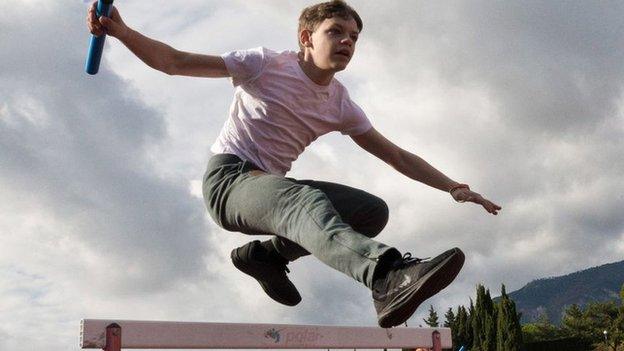School PE funding: Is the money being spent properly?
- Published

Every year, each primary school in England gets a minimum of £16,000 from the government called the PE and sport premium
Friday afternoons at Academy St James primary school in Bradford look a little different to your average lesson. Some kids are playing tag rugby, soft archery and golf. Others are wall-climbing, hula-hooping and cheerleading.
This is called 'enrichment hour' and it's the brainchild of award-winning PE lead Niall O'Brien and headteacher Chris Tolson.
The school is in the top 10% of deprived areas of Bradford and was in special measures. But since focusing more on physical education two years ago it has seen combined attainment levels shoot up from 27% to 63% for achieving age-related expectations.
"We believe that investing in pupils, in terms of their social and emotional wellbeing, is paramount to make sure these children continue to learn," says Tolson. "These sessions are all part of that. For us it makes absolute sense."
Every year, each primary school in England gets a minimum of £16,000 from the government called the PE and sport premium. It's been in place since 2013, when then Prime Minister David Cameron wanted to build a legacy from the London Olympics on the back of repeated warnings about childhood obesity.
This ring-fenced PE cash has cost taxpayers in excess of £1.9bn so far. Every school is meant to report on its website what the money has been spent on, but not every school is using the money well.
One teacher told BBC Sport that at their former school they'd been told there was no money left for PE and they'd just have to be "creative" in the online report.
Other PE professionals have repeatedly claimed some schools simply copy and paste their reports year on year because Ofsted doesn't monitor them. One PE professional, who oversees a number of primaries, claimed last year they'd discovered £100,000 of £230,000 PE funding in their area had been spent inappropriately.
Examples given have included schools using the money to fund iPads, to buy a minibus, or bring in PE coaches to cover teacher marking time (PPA), something that is against recommendations.
BBC Sport has seen a number of documents in which the Department for Education was told about the lack of accountability and how some schools were using the money for inappropriate things.
Schools Minister Nick Gibb said: "Supporting children and young people's physical health and wellbeing is a priority for this government, which is why we launched our ambitious school sport and activity action plan.
"Schools must publish their PE and sport premium plans online and are held to account by Ofsted on the extra-curricular activities they offer pupils."
With the focus of many schools on core subject catch-up after the Covid-19 pandemic, experts say we now need "a cultural shift" with PE at the heart of learning.
Dr Andrew Daly Smith from the University of Bradford says: "We need to stop this conversation that disconnects health from academic performance. If we focus on bringing children into schools to sit them down to catch them up on maths and English, we are going to increase the inequality gap."

'I stole £70,000 to feed my addiction': Meet the young gamblers struggling to overcome betting's mental grip
The Joe Wicks Podcast is back: He talks to Sir Mo Farah about choosing a positive route in life
